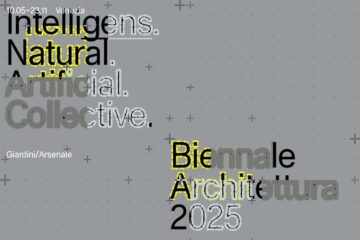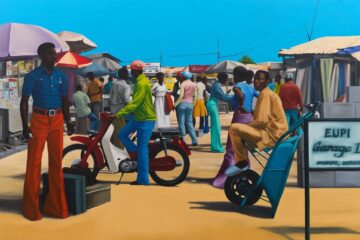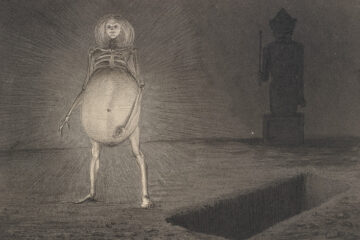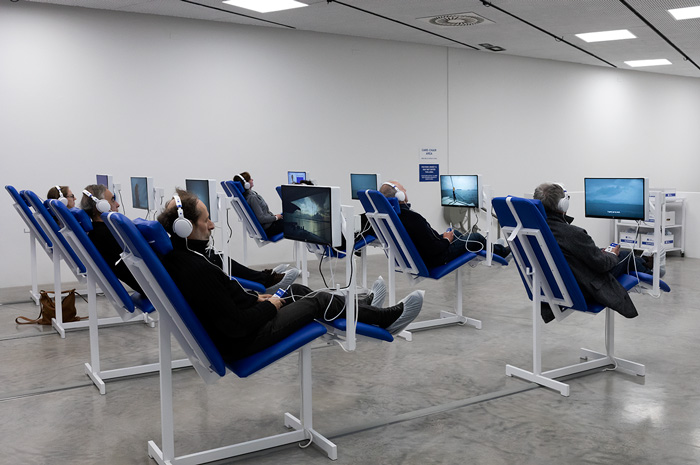
Field Hospital X (FHX) is the artistic project presented in the Israeli Pavilion at the Venice Art Biennale 2019 – 58th International Art Exhibition.
The intent of the artist Aya Ben Ron, creator of the project, is to investigate the reaction of art to the injuries and pains that afflict people and contemporary societies. And the parallelism between “art” and “care of man” is expressed in an absolutely concrete way.
Field Hospital X is in fact a site-specific installation that occupies the entire pavilion: a real “field hospital” divided into three distinct areas, a Reception Area and two Care-Areas.
The literal interpretation of the art-care combination is at the center of the whole project curated by Avi Lubin, which involves, in addition to the artists Aya Ben Ron, Idit Avrahami, Roey Victoria Heifetz & Zohar Melinek Ezra, and an Anonymous Palestinian Artist, also real experts: an anthropologist, a psychoanalyst, a gynecologist, a law professor.
In this artistic hospital, the patient-visitor must follow an obligatory process-path, as in real hospitals, from the Reception Area to the two Care Areas. A speedy visit, a superficial race through the works, is forbidden.
As in real life, before you can even talk to doctors and nurses, you have to get a number for the queue, sit down, and wait.
Here the emotions that art recovers directly from real life begin: the anxiety of waiting mixed with doubtful expectation about what will happen during the actual treatment.
The video shown in the Reception Area of Field Hospital X explains how patients-visitors are asked for a precise participatory effort:
Be patient.
Be a patient.
Care needs time.
This is the first “antidote” that is given: you have to stop running around and take note of the problem. Recognize that care is needed. And to make the cure work we need to dedicate our time, the most precious good in the world.
Once you have entered the right mood, you can start. When our number appears on the luminous sign, we can go to the first nurse to define what is the evil that afflicts us, and to establish the appropriate cure.
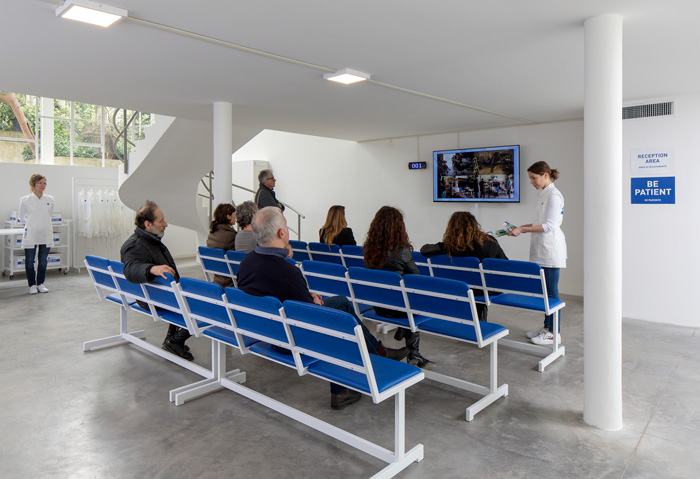
Israeli Pavilion – Field Hospital X – Venice Art Biennale 2019: First Care-Area – Safe Unit
Then we reach the first Care-Area, the Safe-Unit. Made on the model of the “safe room”, this room covered by padded material, is a safe and secluded place, in which the visitor is asked to scream following the recorded instructions, without anyone being able to look or hear.
This treatment follows the theory that it is necessary to “know” one’s own voice, and thus appropriate this “vocal power” to introject the certainty of always having a “voice” ready to react to the challenges and evils of the world.
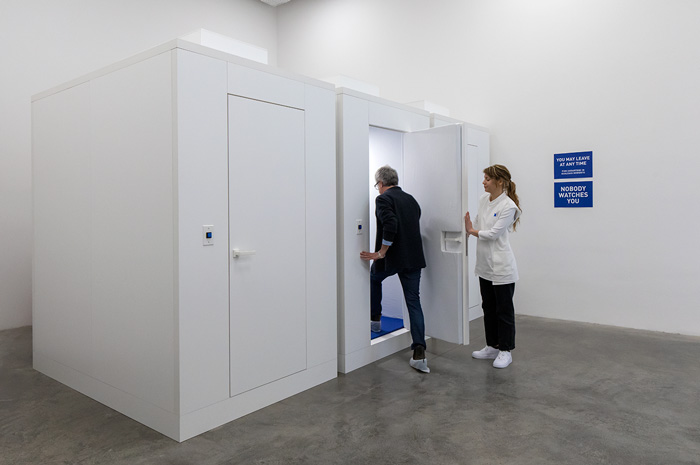
Israeli Pavilion – Field Hospital X – Venice Art Biennale 2019: Second Care-Area – Care-Chairs
The second part of the treatment is administered through individual stations where patient-visitors can sit comfortably and benefit individually from the Care-Kit provided by Field Hospital X.
The first part of the Care Kit is a video made by one of the artists involved.
To whom has chosen, in the Reception Area, the “problem” represented by the phrase “I DO NOT WANT TO THINK ABOUT THAT“, for example, is given the video of Aya Ben Ron, No Body.
In this video, Aya Ben Ron talks about the abuse she suffered as a young family member. After years of silence, the artist has succeeded in sublimating the trauma through art, and sets her example as a cure.
“Habit” is instead the video that narrates the resistance of an anonymous Palestinian artist towards the Israeli occupation, and it is the cure for the problem represented by the question “I AM READY – ARE YOU READY?“.
Alienation from the body and gender identity are the topics covered by the video “Block of Clay” by Roey Victoria Heifetz and Zohar Melinek-Ezra. The vision of this video is proposed as a cure for the theme “I WONDER IF THE TIME HAS COME“.
The last of the problems dealt with by Field Hospital X is instead marked with the phrase: “I NEVER UNDERSTOOD“.
In response to this problem, it is proposed to watch the video “Institutional Abduction” by Idit Avrahami, which deals with the institutionalized kidnapping and tries to shed light on the disappearance of thousands of babies and children belonging to families of Yemenite, Mizrahi and Balkan migrants, in Israel in the 1950s.
After watching the artistic video, it is possible to watch a series of “second opinions“, short videos in which the experts talk about the possible “real“ problems and solutions.
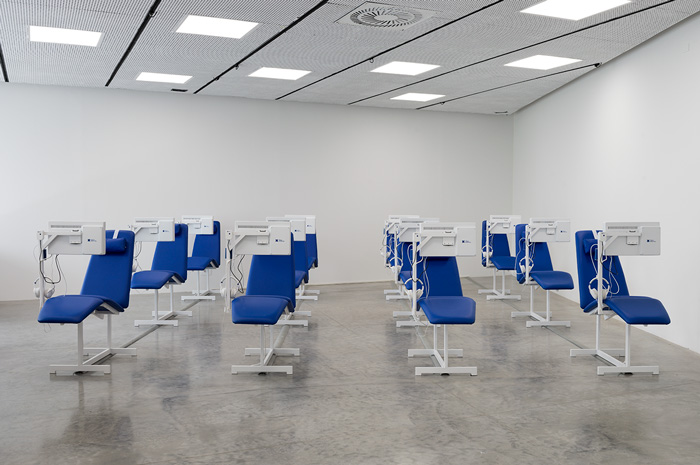
Israeli Pavilion – Field Hospital X – Venice Art Biennale 2019: The end of treatment
After the treatment has ended, the nurses give the patient-visitors leaflets on the “cure” and a bracelet.
The final sentence of the video No Body is shown on the bracelet:
Here Anyone Can Live Free.
The “forced” imposition of time and how to get in touch with the art of the Israel Pavilion is probably its strong point. Especially because, this imposition is made part of the art itself. Having to wait in the queue is not just a “technical“ issue due to the limited number of stations for watching videos. On the contrary, waiting is part of the experience of the visit, it is part of the “performance” that the visitor-patient performs in the overall installation of the Field Hospital X.
The waiting and the experience modalities of the proposed art are not a goal, but a means through which to rediscover an intimate, personal connection with art. They are a way to really be “taken care of” by art.
The Field Hospital X project is proposed as an international mobile institution, which will subsequently be installed in other cities around the world. By doing so, with due time and the necessary efforts on the part of the organizers and users, it will be possible to spread the healing and salvific power of art.
Because “human care” is a result that deserves an effort. And only in this way, taking back the necessary time and attention, man can find a moment of true freedom, as reported by the bracelet.
An intellectual and material freedom, rarer every day in our world.
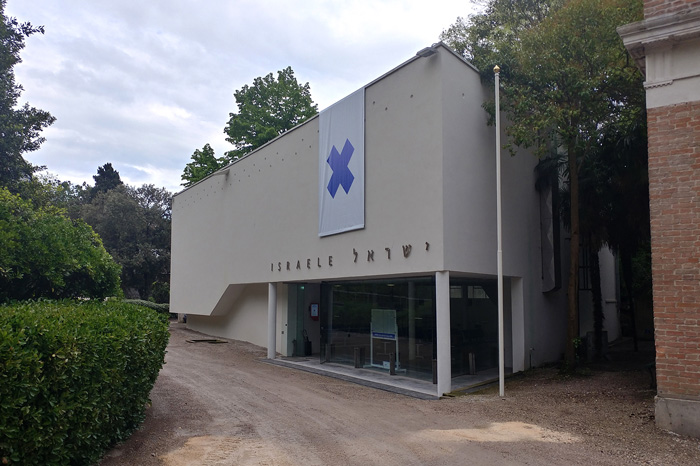
ISRAELI PAVILION
58th International Art Exhibition
La Biennale di Venezia
11.05 – 24.11.2019
Biennale Gardens
Castello, 30122
30124 Venice
Italy
Text by Domenico Fallacara | the PhotoPhore
Discover: fieldhospitalx.org
